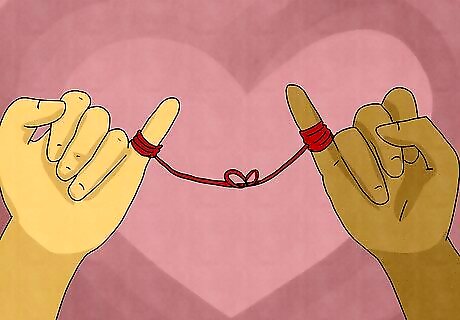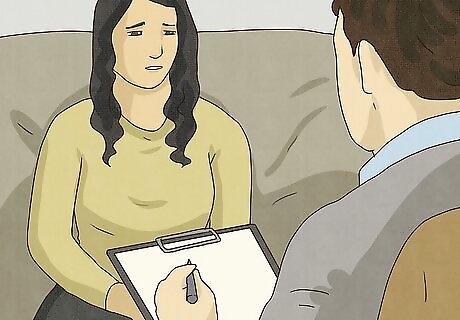
views
- Admit that you’re feeling jealous and ask yourself what’s causing these feelings of jealousy.
- Use your jealousy as motivation to do better and focus on your unique strengths and talents.
- Stop comparing yourself to others and take a break from social media to prevent feeling jealous of others.
Acknowledge your feelings of jealousy.

Admitting you feel jealous is the first step to fixing the issue. When you notice feelings of jealousy starting to creep in, take a few minutes to check in with yourself. Ask yourself “Am I jealous right now?” It's perfectly normal to get jealous once in a while, so don't judge yourself too harshly. But sometimes just naming your emotions can help you gain control over them. Some signs of jealousy include: Spending most of your time wishing you had what others have instead of appreciating what you have. Constantly comparing yourself to your friends, family members, and coworkers, and finding that you always come up short. Feeling unhappy when you see your friends hanging out with other people. Getting upset when your significant other interacts with someone you think they might find attractive. Constantly looking at your significant other's social media for signs that they are cheating on you.
Find the root of your jealousy.

Sometimes there are deeper underlying issues that fuel jealousy. Once you admit that you're struggling with jealousy, it’s time to start looking into why you’re feeling that way. For example, low self-esteem is often a cause of jealousy. When you feel like you’re falling behind everyone else, it’s easy to become jealous when you see other people’s successes. Other possible causes include: Your underlying beliefs about relationships: For example, you might feel like your partner's exes are always a threat to your relationship, or that if your friends have fun with someone else, they won't like you anymore. Past traumas: For example, maybe you were cheated on in the past, and this caused you to start feeling insecure in future relationships. Mental health disorders: Things such as anxiety disorders and depression might leave you feeling jealous of others or insecure about your own relationships.
Use your jealousy to motivate yourself.

Your jealousy might be just what you need to go after what you want. While people often view jealousy as a bad thing, being jealous can actually provide you with a valuable learning opportunity. When you’re jealous, it’s usually because you’ve found something you want but don’t have. So instead of stewing in these jealous feelings, make an effort to go out and get whatever it is you want. For instance, maybe you feel jealous of your best friend because they're pursuing a career as an artist, while you're afraid to take that step. This may be a sign telling you to rethink your career path. If you're jealous of the way a coworker dresses, work on developing your own unique style. Instead of envying someone with a lot of money, make your dollars count. Save up your money to buy just a few nice items that will make you feel good about what you have.
Be trusting of your partner or friend.

Look to see if there’s a rational reason for you to be jealous. Jealousy is often a sign that we're afraid of losing a person who's close to us, but that doesn't actually mean they're doing anything wrong or being unfaithful. Be really honest with yourself about whether your partner or friend has given you a reason to feel jealous. Look for concrete evidence, such as a friend repeatedly canceling plans without any excuse, or flirty messages your partner has sent to someone else. If you come up empty-handed, it might be nothing after all. For example, if you're jealous that your friend is spending time with someone new, but they're still making time for you, you probably don't have anything to worry about. If your partner is frequently dishonest with you or they've broken your trust before, your jealousy could actually be your instincts telling you something's wrong. Consider taking a step back so you can reflect on whether this is really a healthy relationship.
Talk about it with other people.

Talking to others can give you a healthy outlet to vent your frustrations. If you have a lot of pent-up frustration or anxiety caused by jealousy, don’t just keep it to yourself. Take time to sit down with your friend, family member, or partner to tell them what’s going on. If you don’t want to talk to anyone, here are some other suggestions for how to cope: Do deep breathing exercises, meditation, or mindfulness exercises. Exercise to burn off the stress and clear your head. Write down your thoughts and feelings in a journal.
Focus on your positive qualities.

Find your own unique strengths to combat feelings of jealousy. Sometimes jealousy is rooted in feelings of insecurity and low self-esteem. However, it's important to remember that you're a unique individual who has lots of special talents and abilities. When you start feeling those tell-tale signs of jealousy, remind yourself of all the things that make you amazing. Write down all of the things you love about yourself and your life, such as your relationships, your amazing job, or how much you’ve grown in the past few years. When you're feeling jealous, read over the list to help you feel more confident. When you start having negative thoughts about yourself, make an effort to change them to positive thoughts. For example, instead of saying “I’ll never be able to do that,” say something like, “If I practice really hard, I’ll be able to do that too someday.”
Stop comparing yourself to others.

Constantly comparing yourself to others can fuel feelings of insecurity. It can be tempting to compare yourself to others and want to compete against them. However, constantly setting yourself up against others can just make your jealousy and feelings of insecurity worse. Stop comparing yourself to others and instead focus on yourself and how you’re doing. Instead of competing against others, compete against yourself to be the best version of yourself. Even though someone’s life may appear perfect on the outside, they may have had to face their own hardships and trials to get where they are.
Limit your time on social media.

Social media tends to only show the “perfect” parts of someone’s life. If you struggle with jealousy, it can sometimes be tempting to scour through other people's profiles to look for flaws. However, most of the time those impulses will just feed your jealousy and make it worse. To stop any jealous feelings from forming, log off for a while and do something more productive instead. For example, if you see that your friend is posting a lot of pictures with other people on social media, let that motivate you to call them up and make plans to hang out.
Spend time pursuing your hobbies.

It’s harder to be jealous when you genuinely take pride in what you do. Prioritize your interests and goals and invest more of your time and energy into them. Keep setting new goals for yourself so you stay challenged. When you're genuinely happy with what you have going on, you'll feel more confident in what you have to offer. For example, you might train to run a 5k, start a side hustle, learn to play a musical instrument, or take a class to learn a new skill.
Build meaningful relationships with others.

Do things that make you feel more secure in your relationships. If you’re feeling jealous or threatened by others within your relationships, it might be because you’re feeling a bit unfulfilled. To help remedy this, spend more time engaged in meaningful conversations or activities with your friends, partner, or family. For romantic relationships, work on strengthening your communication skills with your partner and setting boundaries to help prevent jealousy. If you feel jealous or insecure in your relationship, tell your partner or friend directly. This will help you open up a dialogue about what you and the other person can do to make those jealous feelings go away. For example, talk with your romantic partner about establishing regular date nights where you two can reconnect and just focus on one another. Put more effort into relationships where you truly feel valued. If someone makes you feel bad about yourself—like if they constantly brag about what they have or put you down—it may be time to move on.
Count your blessings.

Reminding yourself of the good things leaves little room for jealousy. When you're blinded by jealousy, it can be hard to see the good things in your life. Make it a habit to remind yourself every day of the things you’re thankful for and the things you love about your life. The more you practice being grateful, the less likely you are to be jealous of others. Some things you might be grateful for include your family, your friends, your job, food to eat, water to drink, and a roof over your head. Start a gratitude journal to look at and gain strength from whenever you feel jealousy beginning to creep in. Consider spending some time helping others to remind yourself how fortunate you are. For instance, you might volunteer in your community or help a friend who's going through a hard time.
Calm down before acting on your feelings.

Take some time to cool off so you won't say anything you'll regret. There's nothing wrong with feeling jealous—it happens to everyone. However, feeling jealous isn't the same as acting jealous. Sulking, withdrawing from people, or aggressively lashing out might cause a rift in your relationships, so it’s best to take a deep breath and let yourself cool off before acting on your emotions. It can sometimes be tempting to pull away from the other person in an effort to get them to reassure you. Unfortunately, this will often have the opposite effect and create distance in your relationship. If you can, excuse yourself from the situation for a few minutes. Take a few deep breaths to help yourself feel more in control. Then, start to process what you're feeling and go back once you’ve sorted through your thoughts. If you do decide to talk to the other person about how you're feeling, wait until you've had time to really cool down and sort through your thoughts.
Talk to a therapist if the feelings persist.

A therapist can help you work through any underlying issues. Sometimes, jealousy is rooted in things that happened in your early childhood. A trained therapist can help you see how your past is affecting your present, and they can also help you work on strategies to overcome that. They may also be able to help you with increasing your confidence and self-esteem. For example, you may have an insecure attachment style if you constantly struggle with your sense of self-worth and feel like everyone around you is going to leave. A therapist can help you become more confident to prevent this from becoming a self-fulfilling prophecy. Use sites like betterhelp.com to find a licensed therapist near you.




















Comments
0 comment